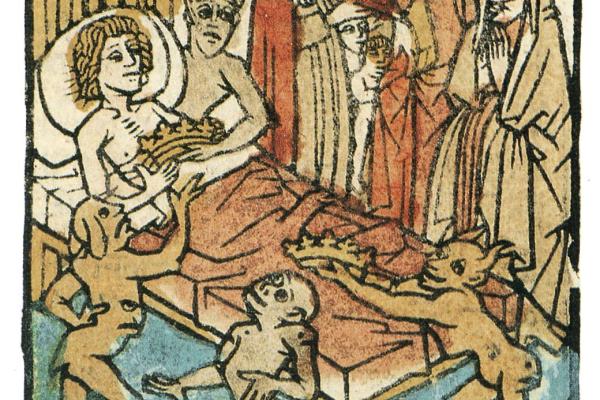
Please join us for this final entry in our 2021-2022 Lecture Series! This event, as with all the lectures in our annual series, is free and open to the public. **Rescheduled from February 25**
Registration link for Zoom attendance: https://osu.zoom.us/meeting/register/tJErcOqsrTkqEt277TpiR6EfHoWSE0Qi-fm0
Registration link for in-person attendance: https://cmrs.osu.edu/events/2021-2022-in-person-rsvp-form
Abstract: This lecture explores the imagination of the 'good death' in late medieval England alongside aspects of its actual practice. From the late fourteenth-century on, the ideal of the good death was shaped and promoted through vernacular books on the 'art of dying’: archival evidence suggests that these books, which, through a mix of ritual and ethical instruction, allowed their readers to manage the lives and deaths of others as well as prepare for their own, were mostly owned by urban gentry and merchant men. From other evidence, however, it appears that the actual work of preparing others for death at this period was largely associated with women, especially spiritually ambitious women, who sought opportunities in city hospitals or in neighbors' homes to attend at a deathbed. Drawing on ars moriendi manuals, civic and institutional records, and literary texts by Margery Kempe, Julian of Norwich, and Thomas Hoccleve, the lecture will trace how 'learning to die' was simultaneously able to play important roles both in literary and civic environments dominated by men and the cultural practices that shaped the religious identities of devout women.
Bio: Amy Appleford’s teaching and research are focused on the literature and culture of the English middle ages. She teaches courses on medieval romance; early English drama; European early women writers; Chaucer; Langland; fifteenth-century poetry; disability studies; critical race theory; histories of the body; and history of the English language. Her on-going research interests encompass the interrelations of literature, civic culture, and political thought with Christian belief and practice; medieval women’s visionary writing and mysticism; book history and early text technologies; histories of the body and cultural understandings of embodiment.
She has published on Middle English poetry; early drama and civic culture; late medieval visionary writing; fifteenth-century urban culture; and Shakespeare, in scholarly venues including the Journal of Medieval and Early Modern Studies; The Chaucer Review; and the Journal of English and Germanic Philology.
Learn about her latest research and activities via her profile page on the website of the Department of English at Boston University.
The Zoom livestream of this event will be presented with automated closed captions. If you wish to request traditional CART services or other accommodations, please contact cmrs@osu.edu. Requests made by about 10 days before the event will generally allow us to provide seamless access, but the university will make every effort to meet requests made after this date.
Effective 08/02/2021, students, faculty, staff and visitors to all Ohio State campuses and medical facilities are required to wear masks indoors, regardless of their vaccination status. Masks continue to be required outdoors for unvaccinated individuals when they cannot maintain physical distancing. Fully vaccinated people are not required to mask outdoors.
Co-sponsored by the Center for the Study of Religion as part of its 2020-2022 Living Well, Dying Well event series.
